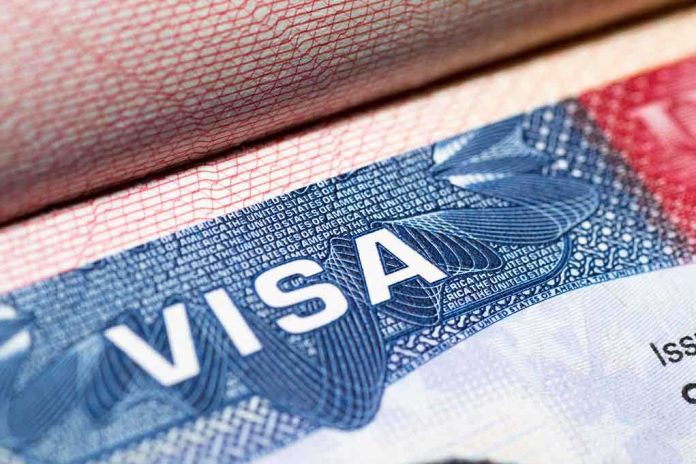
President Trump’s newly implemented $100,000 H-1B visa fee has been swiftly undermined by a Department of Homeland Security loophole, sparking outrage among Americans who demand real immigration reform.
Story Snapshot
- Indian students are exempted from Trump’s $100,000 H-1B fee, provoking frustration over weak enforcement.
- The Department of Homeland Security’s new regulation creates a loophole benefiting foreign nationals.
- Conservatives criticize the exemption as undermining efforts to curb abuse of the H-1B system.
- Trump’s administration faces pressure to close loopholes and prioritize American workers.
Department of Homeland Security’s Regulation Sparks Backlash
The Department of Homeland Security introduced new regulations that exempt Indian students from the $100,000 fee imposed on new H-1B outsourcing workers. This exemption immediately drew criticism from conservative Americans, who see it as a direct contradiction to President Trump’s campaign promise to put American workers first. Many argue that such loopholes allow foreign nationals to bypass the intended impact of tough immigration policies, frustrating those who expect robust enforcement and accountability from the government.
Conservative Concerns Over H-1B Abuse and American Workers
Conservative critics have long called attention to the abuse of the H-1B visa system, which they believe has contributed to wage suppression and job loss among American workers. The exemption for Indian students is viewed as a setback in efforts to reform the program and prioritize employment opportunities for citizens. By allowing certain foreign nationals to avoid the hefty fee, the Department of Homeland Security’s decision is seen as a threat to economic fairness and a blow to the administration’s pledge to restore American jobs. The move fuels ongoing debates about the integrity of immigration enforcement and the effectiveness of executive action under the Trump administration.
Legal and Policy Implications for Immigration Reform
Legal analysts note that the Department of Homeland Security’s regulation may face challenges from lawmakers and advocacy groups concerned about the erosion of immigration policy objectives. The loophole not only undermines the financial deterrent intended by the fee but also raises questions about the consistency and transparency of executive decision-making. For many conservatives, the exemption represents another example of bureaucratic maneuvering that puts special interests above the rule of law and the wellbeing of American families. Calls for congressional oversight and tighter regulation are likely to intensify as more details of the policy emerge.
Impact on Conservative Values and the Rule of Law
The exemption for Indian students from Trump’s H-1B fee is seen by many as an affront to constitutional values and the principle of equal protection under the law. Conservatives argue that such policies erode trust in the federal government’s commitment to defend American workers and uphold the integrity of immigration laws. The situation underscores the need for vigilance against government overreach, loopholes, and agendas that undermine the nation’s sovereignty. As the Trump administration faces mounting pressure to deliver on its promises, the spotlight remains on how these regulatory decisions align—or conflict—with the core values cherished by conservative Americans.
Sources:
Indians Celebrate ‘Massive Loophole’ in Trump’s $100,000 H-1B Fee



